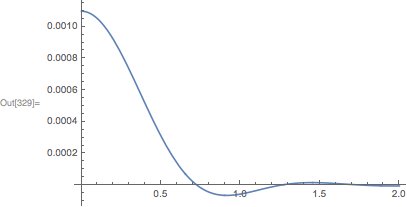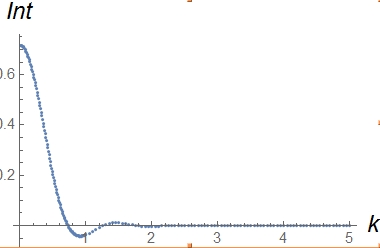For this integral, you can use a trick where you replace a parameter with an exact numeric quantity, and then replace the exact numeric quantity with a variable. For example, lets replace your 72247.9 with Pi and 1.85185 with EulerGamma:
sint = Integrate[
(r Sin[k r])/(Pi k + k Exp[EulerGamma r]),
{r,0,Infinity},
Assumptions -> k>0
]
(2 EulerGamma)/(EulerGamma^2 + k^2)^2 + (
I π (LerchPhi[-π, 2, 2 - (I k)/EulerGamma] -
LerchPhi[-π, 2, 2 + (I k)/EulerGamma]))/(2 EulerGamma^2 k)
(it is possible to evaluate the integral using s and t directly, but it takes a much longer time). Now, we need to replace Pi with s and EulerGamma with t:
sint /. {EulerGamma -> t, Pi -> s}
(2 t)/(k^2 + t^2)^2 + (
I s (LerchPhi[-s, 2, 2 - (I k)/t] - LerchPhi[-s, 2, 2 + (I k)/t]))/(2 k t^2)
Based on the above, it's reasonable to assume that the integral is:
int[s_, t_, k_] = sint /. {EulerGamma -> t, Pi -> s};
Or, in TeX:
$$\int _0^{\infty }\frac{r \sin (k r)}{k e^{r t}+k s}dr=\frac{2 t}{\left(k^2+t^2\right)^2}+\frac{i s \left(\Phi \left(-s,2,2-\frac{i
k}{t}\right)-\Phi \left(-s,2,\frac{i k}{t}+2\right)\right)}{2 k t^2}$$
The NIntegrate version is:
Options[nint] = {WorkingPrecision->50};
nint[s_, t_, k_, OptionsPattern[]] := NIntegrate[
(r Sin[k r])/(s k + k Exp[t r]),
{r,0,Infinity},
WorkingPrecision->OptionValue[WorkingPrecision]
]
Here are some plots comparing int with nint:
Plot[int[1000, t, 2], {t, 0, 1}, WorkingPrecision->50,PlotRange->All]
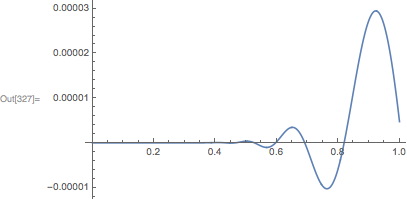
Plot[nint[1000, t, 2], {t, 0, 1}, PlotRange->All, WorkingPrecision->50]
NIntegrate::precw: The precision of the argument function ((r Sin[2 r])/(2000+2 E^(0.0000204286 r))) is less than WorkingPrecision (50.`).
NIntegrate::deodiv: DoubleExponentialOscillatory returns a finite integral estimate, but the integral might be divergent.
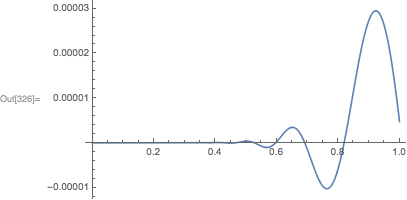
These plots take a long time to evaluate, so I will only show one more. Here is a plot of the function at the point of interest for the OP:
Plot[int[72248.9`50, 1.85185`50, k], {k, 0, 2}, WorkingPrecision->40]
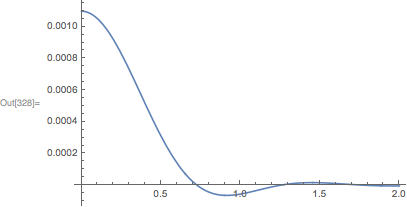
Plot[nint[72249.9`50, 1.85185`50, k], {k, 0, 2}, WorkingPrecision->40]
NIntegrate::precw: The precision of the argument function ((r Sin[0.0000408571 r])/(2.95192 +0.0000408571 E^(1.8518500000000000000000000000000000000000000000000 r))) is less than WorkingPrecision (50.`).
NIntegrate::deorela: The relative error 1.6273881429326276607971423877290476125687271847202`50. is larger than expected for the integrand (r Sin[0.000040857142857142848336223645011600069665291812270880 r])/(2.9519244857142847848763267393223941326141357421875+0.000040857142857142848336223645011600069665291812270880 2.7182818284590452353602874713526624977572470937000^(1.8518500000000000000000000000000000000000000000000 r)) over {0,[Infinity]} with DoubleExponentialOscillatory method and automatic tuning parameters, TuningParameters -> {10,5}. The integration will proceed with TuningParameters -> {1,5}.
